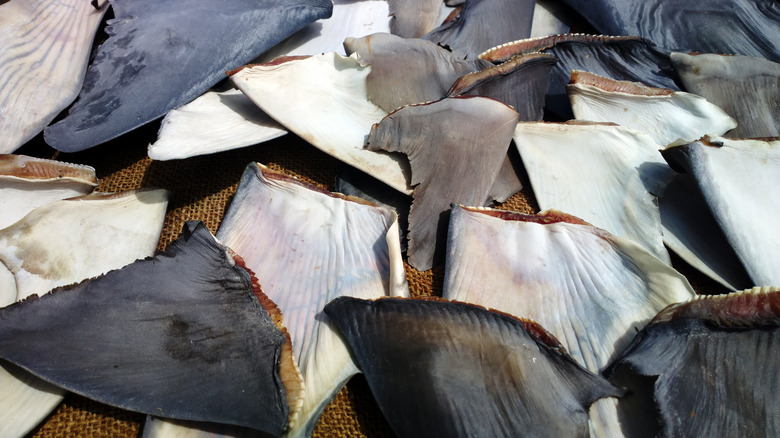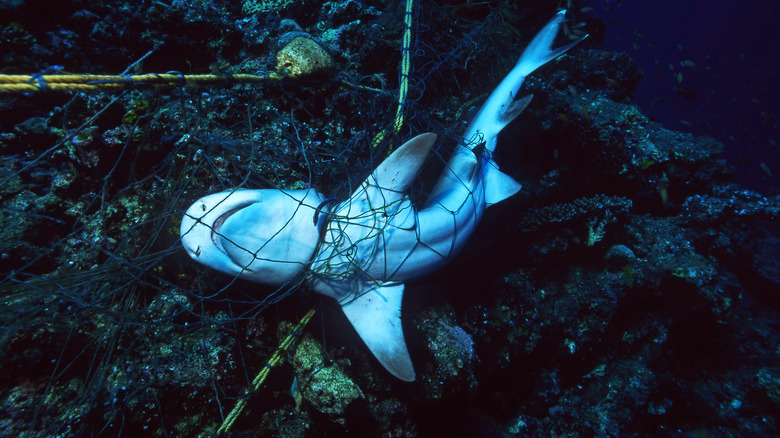The Reason Shark Fins Are So Controversial In The US
CORRECTION 12/28/22: A previous version of this article stated the Shark Fin Sales Elimination Act had not been passed into law in the United States. On December 23, 2022, President Biden signed the bill into law as part of the James M. Inhofe National Defense Authorization Act for Fiscal Year 2023.
Few things beat the coziness of nuzzling into a blanket with a good book and warm soup during the colder months, but shark fin soup is likely the last kind that would come to mind when doing that. Shark fin soup is a delicacy in many Asian countries, particularly China, where this style of soup has been cooked and eaten since the Song Dynasty — an era that lasted from AD 960 to 1279, as explained by The Guardian.
A big part of shark fin soup's continued appeal comes from its supposed medicinal properties. According to CNN, this controversial ingredient is a staple of traditional medicine in Asia, where it's believed to cure cancer and provide an overall improvement in one's health. This belief persists despite studies showing that shark fin soup is more likely to harm your health than help it (via Insider). A study published in "Science of The Total Environment" shows that shark fins contain a high concentration of monomethylmercury, a compound that may cause cancer, as per J Prev Med Public Health.
Aside from its negative health effects, the ongoing consumption of shark fins fuels the industry, which kills an estimated 50 million sharks every year, according to the Animal Welfare Institute. The cruel process of shark fin harvesting leaves sharks alive but unable to swim when they are dumped back into the ocean.
Gaps in the fight against the shark fin trade
Organizations such as Oceana have been championing a ban on the trade of shark fins in the United States that prohibits not only fishing for shark fins in U.S. waters but also all sale of shark fins throughout the country, according to Oceana's website. Though the Shark Finning Prohibition Act, which bans the fishing of sharks for the sole purpose of taking their fins, has been in effect since December 21, 2000, shark fins are still available for consumption due to a lack of laws and regulations that ban their sale outright on a national level.
This allows shark fin soup to remain on the menu of Asian many restaurants in the United States, where demand for the rare ingredient remains high enough that the soup can cost up to $100 per bowl, as reported by Discover Wildlife. Despite its continued popularity, shark fin soup may soon disappear as legislators begin to close the net on the shark fin trade.
The U.S. is set to finally ban shark fin trade
The U.S. Senate began its efforts to close the loopholes of the Shark Finning Prohibition Act of 2000 with the introduction of the Shark Fin Sales Elimination Act on April 13, 2021, which would make it illegal to sell and transport shark fins and products containing it (via Congress). A similar act was also introduced by the House of Congress Committees of Natural Resources and Budget later that month, according to Congress.
"The gruesome shark-finning practices are eliminating shark populations and putting many species on the brink of extinction," Texas Congressman Michael McCaul shared in a press release. "Sharks play a vital role in our marine ecosystem. ...Thus, making this bipartisan legislation that much more important."
The Shark Fin Sales Elimination Act went through two readings before being referred by Senate to the Committee on Commerce, Science, and Transportation. On December 23, 2022, according to a White House press release, President Joe Biden passed the act into law when he signed the James M. Inhofe National Defense Authorization Act for Fiscal Year 2023, finally making it illegal to sell, possess, and transport shark fins and shark-fin products.


